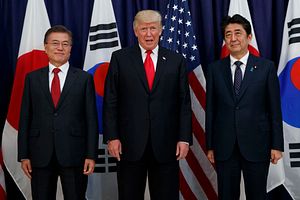As South Korea and Japan sink deeper into their bilateral conflict, many observers in the United States have erupted in a chorus of alarm at the absence of American leadership. “This is what a world without American leadership looks like,” declared Slate, while the New York Times has called the Korea-Japan feud a “telling sign…of America’s diminished leadership role.” “Washington is sleeping” was the diagnosis from Foreign Affairs. The Center for Strategic and International Studies (CSIS) has explicitly called for U.S. mediation: “Only the United States can pull Japan and Korea back from the brink.”
But what does American leadership even mean?
For Washington, leadership has traditionally meant getting its two Asian allies to sacrifice their nationalism at the altar of collective defense. As Washington sees it, historical grievances should come second to the higher ideal of solidarity against North Korea and China. Infighting between South Korea and Japan over history is, therefore, “detrimental… to the national security of both [South Korea and Japan].” Patrick Buchan of CSIS calls it the “curse” of the United States, as the leader and “tie-break[er]” of the trilateral alliance, to have to remind the two Asian allies of what is truly at stake when they bicker.
But American leadership, construed in this way, is not the solution to the crisis, but one of its causes. As historian Alexis Dudden explains in the New York Times, it was American influence that rushed Seoul and Tokyo, often reluctant, into security agreements that ignored the festering historical pain underneath. Fred Kaplan points out that even U.S. President Obama missed the larger picture when he chided the Japanese and South Korean leaders “to look forward,” as if history was something that “merely happened long ago and [no longer] pervade[s] daily life.”
This version of American leadership tells Japan and South Korea that their deep reasons for distrust are not legitimate, and that fighting over core issues which have time and again proven to be of recurring importance to their respective electorates is somehow against their own interest. If the recurrence of conflict demonstrates anything, it shows that despite the United States’ best efforts, the blisters will burst. President Trump’s recent corn-dumping on Japan and demands on South Korea to increase its financial contribution to the alliance further blur the line between American leadership and American bullying.
The concept of American mediation is especially misleading. For American “mediation” to be fruitful, it ultimately requires taking sides or at least treading an extremely precarious line where the first signs of U.S. preference toward one country could spark feelings of disappointment, betrayal, and even anti-American sentiment in the other. This explains why Japan and South Korea are frantically waging a public relations war in the American media, each trying to gain an edge in a contest to win Washington’s ear: Then Japanese Foreign Minister Taro Kono (now defense minister) published a scathing editorial against South Korea in Bloomberg in early September, targeting American public opinion. Not to be outdone, the South Korean Foreign Ministry struck back three days later with a letter of its own, criticizing Japan on the Wall Street Journal. These public exchanges, designed to happen in plain sight of the American public, are rare and telling. To each country, American “leadership” is something to be enlisted in a battle against the other side.
What America can provide through leadership is not mediation, but clarity in its own policy toward North Korea. Japan and South Korea, as former colonizer and colony, have never been natural partners. Since the beginning of their modern bilateral relationship, the glue holding the two has always been the existence of a common enemy. The relationship tends to be strongest when North Korea is most belligerent and its threat perception large enough to overcome historical enmity between Seoul and Tokyo. It was on the heels of North Korea’s sixth nuclear test in late 2016, for instance, that South Korea signed the General Security of Military Information Agreement (GSOMIA), a military intelligence-sharing pact with Japan.
But that pact has now been axed under South Korean President Moon Jae-in. A consensus on the North Korean threat no longer exists in the U.S. trilateral alliance. Moon is conducting his North Korea diplomacy based on a theory of inter-Korean unity and peaceful coexistence with Pyongyang. Meanwhile, Trump has sent incoherent signals, pursuing direct diplomatic engagement with Kim Jong Un in a dramatic reversal from earlier threats of “fire and fury.” At the same time, Trump has openly entertained reducing U.S. forces in South Korea while downplaying North Korean ballistic missile launches. For Japanese Prime Minister Shinzo Abe, whose remilitarization agenda benefits from North Korean provocations, Seoul and Washington’s drift toward engagement with North Korea has triggered deep anxieties that Tokyo will be left behind in a “Japan passing.” The rocky relationship between Seoul and Tokyo is enabled by this crack in the threat perception of a common enemy that necessitated the relationship in the first place.
For its part, North Korea has objectively refrained from conducting additional nuclear tests since 2017. But it is up to the United States, as the leader of the alliance, to produce a clear, coherent policy to consolidate Seoul and Tokyo under a single operating consensus toward North Korea. After all, leadership is not passive: Washington has always led its allies toward something, whether against Nazi Germany, the Soviet Union, or ISIS. What the Allies need is not an American mediation. It is a common destination.
Brian J. Kim is a J.D. candidate at Yale Law School, where he is a Kerry Fellow and an editor of the Yale Law Journal. He holds a Bachelor’s degree in International Relations from Princeton and a Master’s in China Studies from Peking University, where he studied as a Yenching Scholar.

































